“Fear today. Famine tomorrow!
By Brian E. Muhammad, Staff Writer- April 25, 2022
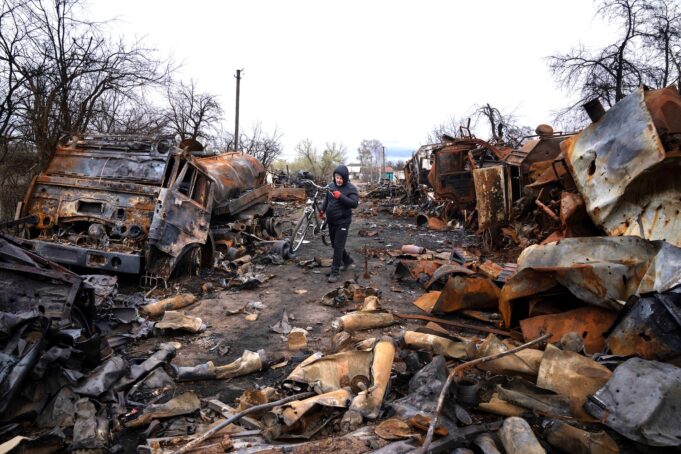
Famine, chaos looms as Russia-Ukraine war fallout spreads
“And ye shall hear of wars and rumors of wars: see that ye be not troubled: for all these things must come to pass, but the end is not yet. For nation shall rise against nation, and kingdom against kingdom: and there shall be famines, and pestilences, and earthquakes, in divers places.”
—Matthew, 24: 6-7
The devastation of Russia’s war on Ukraine and the response of American and NATO-backed allies extends far from the battlefield in Eastern Europe. The reverberation of the conflict is felt in the distant lands of Africa, the Middle East and, in other projections, North America.
Advertisement
 ›
›Several long months of fighting has meant death, bloodshed, destruction of cities, forced migration, and displacement of millions of people. But added to these costs of war is the threat of food insecurity and fears of famine in other parts of the world, especially in Africa and the Middle East, where millions are already facing food insecurity. Not to mention, increased hunger and need for food support in the United States.
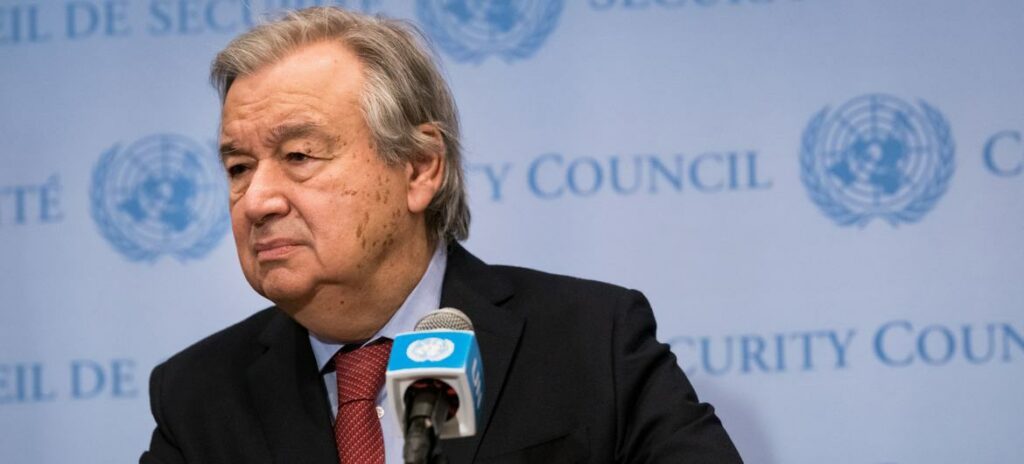
UN Secretary-General António Guterres briefs reporters on the war in Ukraine. Photo: UN Photo/Mark Garten
Together Russia and Ukraine account for a quarter of the world’s exports of wheat and grain. Russia is the largest exporter of wheat in the world, producing around 33 million tons per year. Ukraine supplies 20 million tons of wheat to the world market.
“After weeks of conflict, however, many agricultural fields across Ukraine have been turned into battlefields,” said Tomson Phiri, global spokesman for the World Food Program (WFP).
Mr. Phiri said hikes in food and oil prices are driving up the WPF operational costs to $71 million a month, reducing its ability to serve those in need. He lamented this comes at a time when the world is experiencing a year of unprecedented hunger. “So how can Ukrainians keep farming and how can they get their food to the rest of the world?” Mr. Phiri asked.
There is a wider story of the Russia and Ukraine war: Hunger and suffering in poorer nations like Somalia, Ethiopia, Yemen, and Lebanon.
Part of the challenge of harvesting during an active war is the strain on the supply system, which means problems getting grain products to the global market.
Seeds for the world’s food cannot be planted or harvested from the rich black earth in Ukraine while land mines are planted for war and destruction. Nor can seeds be planted while farmers are pre-occupied fighting for their country.
Together Russia and Ukraine account for a quarter of the world’s exports of wheat and grain. Russia is the largest exporter of wheat in the world, producing around 33 million tons per year. Ukraine supplies 20 million tons of wheat to the world market.
“After weeks of conflict, however, many agricultural fields across Ukraine have been turned into battlefields,” said Tomson Phiri, global spokesman for the World Food Program (WFP).
Mr. Phiri said hikes in food and oil prices are driving up the WPF operational costs to $71 million a month, reducing its ability to serve those in need. He lamented this comes at a time when the world is experiencing a year of unprecedented hunger. “So how can Ukrainians keep farming and how can they get their food to the rest of the world?” Mr. Phiri asked.
There is a wider story of the Russia and Ukraine war: Hunger and suffering in poorer nations like Somalia, Ethiopia, Yemen, and Lebanon.
Part of the challenge of harvesting during an active war is the strain on the supply system, which means problems getting grain products to the global market.
Seeds for the world’s food cannot be planted or harvested from the rich black earth in Ukraine while land mines are planted for war and destruction. Nor can seeds be planted while farmers are pre-occupied fighting for their country.
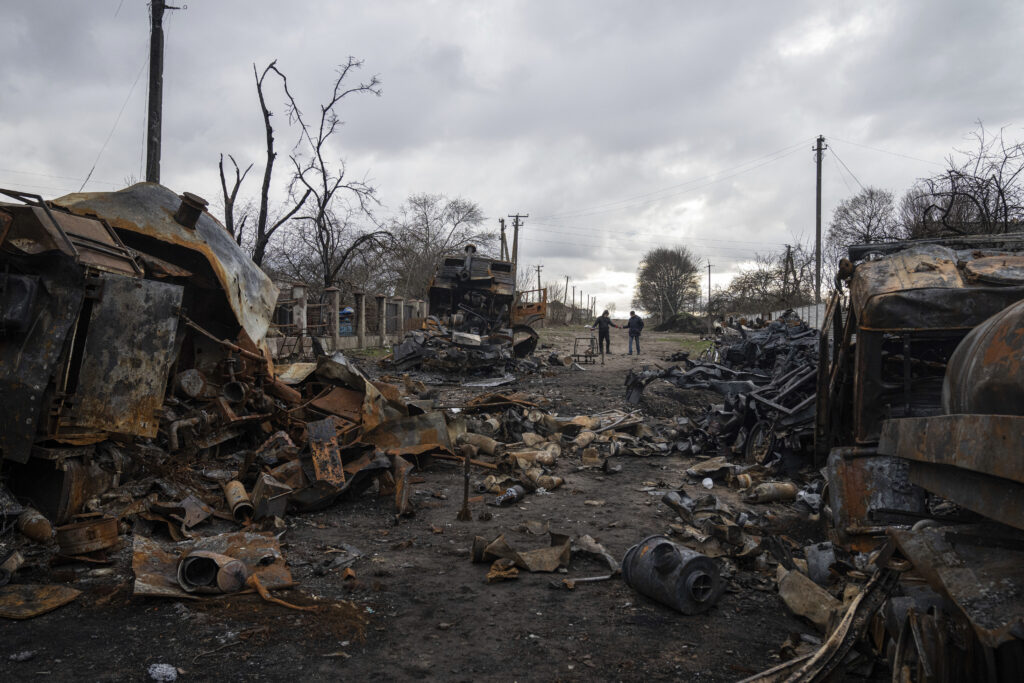
Men walk along a street filled with destroyed Russian military vehicles near Chernihiv, Ukraine, April 17. Witnesses said multiple explosions believed to be caused by missiles struck the western Ukrainian city of Lviv as the country was bracing for an all-out Russian assault in the east. AP Photo/Evgeniy Maloletka
This couldn’t have come at a worse time. In countries such as Afghanistan, Ethiopia, Syria and Yemen, food prices are reaching record highs. The number of people who are food insecure is soaring. Need for food had already surpassed available resources before the war, and now buying and transporting food has become a lot more expensive.
The African adage “when elephants fight, only the grass suffers” describes the impact of the Russian-Ukrainian conflict on Africa and the Middle East. Russia and Ukraine are substantial breadbaskets for world nations. When the basket is disrupted, the consequence is desperation, hunger, and political problems as seen in Sudan, which has had mass uprisings against the military government over increased freedoms and the price of bread.
It’s hard to pinpoint the war’s exact toll because the conflict started amid other calamities, including a series of droughts in different parts of the world that had pushed food prices to record levels. The conflict also comes while nations and people are still reeling from the economic fallout of the two-year-old Covid-19 pandemic.
Before Russia invaded Ukraine, 44 million people in 38 countries were on the threshold of starvation, according to the United Nations. The UN estimates the war will increase this figure by eight to 13 million people or more, mostly in North Africa and the Middle East.
Egypt’s prime minister fixed bread prices, Bangladesh launched a nationwide food subsidy program, and consumers in Indonesia noticed a favorite instant noodle dish went out of stock, according to an NPR report on the Ukraine war’s impact. In Lebanon, families have begun selling belongings for money to buy food. Maya Terro, founder of FoodBlessed Lebanon, told NPR the country had experienced increased demand and some food prices in Lebanon had increased by 1,000 percent as 80 percent of its wheat comes from Ukraine.
This couldn’t have come at a worse time. In countries such as Afghanistan, Ethiopia, Syria and Yemen, food prices are reaching record highs. The number of people who are food insecure is soaring. Need for food had already surpassed available resources before the war, and now buying and transporting food has become a lot more expensive.
The African adage “when elephants fight, only the grass suffers” describes the impact of the Russian-Ukrainian conflict on Africa and the Middle East. Russia and Ukraine are substantial breadbaskets for world nations. When the basket is disrupted, the consequence is desperation, hunger, and political problems as seen in Sudan, which has had mass uprisings against the military government over increased freedoms and the price of bread.
It’s hard to pinpoint the war’s exact toll because the conflict started amid other calamities, including a series of droughts in different parts of the world that had pushed food prices to record levels. The conflict also comes while nations and people are still reeling from the economic fallout of the two-year-old Covid-19 pandemic.
Before Russia invaded Ukraine, 44 million people in 38 countries were on the threshold of starvation, according to the United Nations. The UN estimates the war will increase this figure by eight to 13 million people or more, mostly in North Africa and the Middle East.
Egypt’s prime minister fixed bread prices, Bangladesh launched a nationwide food subsidy program, and consumers in Indonesia noticed a favorite instant noodle dish went out of stock, according to an NPR report on the Ukraine war’s impact. In Lebanon, families have begun selling belongings for money to buy food. Maya Terro, founder of FoodBlessed Lebanon, told NPR the country had experienced increased demand and some food prices in Lebanon had increased by 1,000 percent as 80 percent of its wheat comes from Ukraine.
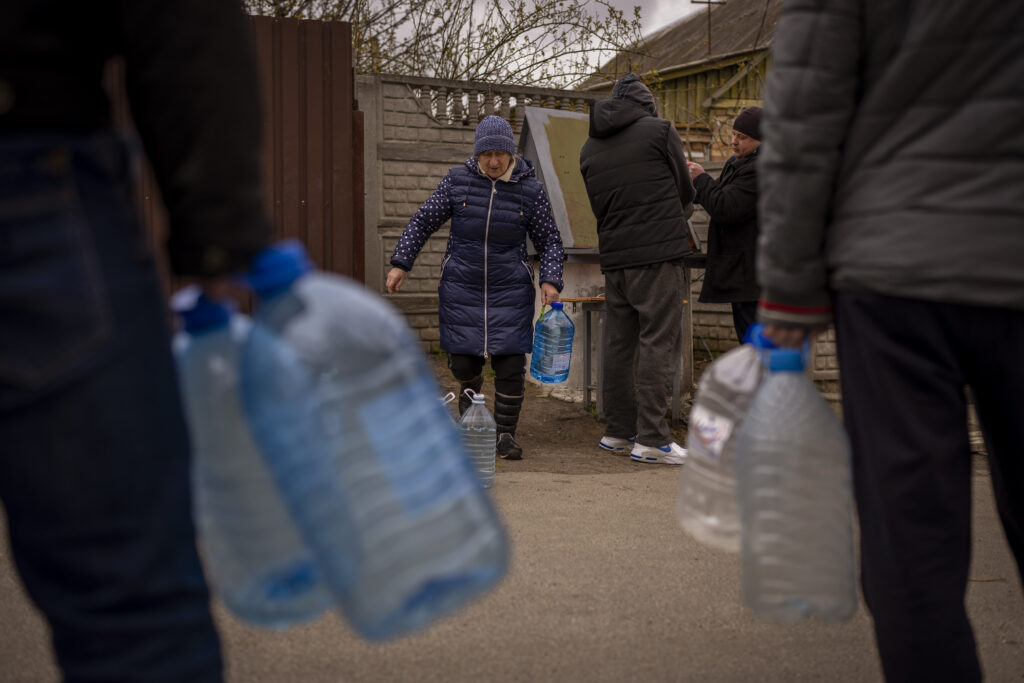
Local residents fill their bottles with water they draw from a public fountain in Bucha, on the outskirts of Kyiv, on April 18. Citizens of Bucha are still without electricity, water and gas after more than 43 days since the Russian invasion began. AP Photo/Emilio Morenatti
According to an April 8 report by the United Nations Food and Agriculture Organization, a global “food price index” has spiked at 12.6 percent—marking its highest level since the UN implemented the index in 1990.
The price of vegetable oils increased by 23 percent in March, wheat prices by 20 percent and maize 19.1 percent. The report said this April’s increase indicates a rise in world prices of wheat and coarse grains largely driven by conflict-related export disruptions in Ukraine and, to a lesser extent, in Russia. The unexpected loss of exports from the Black Sea region exacerbated the already tight global availability of wheat.
The Black Sea region is the exit point of commodities to the world market; however, it is widely stalled due to the war. Preliminary UN estimates say Ukraine has lost 20 percent to 30 percent of its acreage and exports due to the war so far.
Along with the war there is also frustration aimed at how Ukraine as a White European nation in turmoil has become prioritized at the expense of non-White nations also in crisis.
“I don’t know if the world really gives equal attention to Black and White lives,” said Tedros Adhanom Ghebreyesus, head of the World Health Organization.
Ukraine’s crisis deserves attention as “it impacts the whole world,” Mr. Ghebreyesus agreed. “But even a fraction of it isn’t being given to Tigray [in Ethiopia], Yemen, Afghanistan and Syria and the rest. A fraction,” he said.
“I need to be blunt and honest that the world is not treating the human race the same way. Some are more equal than others,” he said. “It is difficult to accept … but it’s happening,” the director-general said in remarks during a virtual press briefing on Covid-19, Ukraine, and other global issues.
According to an April 8 report by the United Nations Food and Agriculture Organization, a global “food price index” has spiked at 12.6 percent—marking its highest level since the UN implemented the index in 1990.
The price of vegetable oils increased by 23 percent in March, wheat prices by 20 percent and maize 19.1 percent. The report said this April’s increase indicates a rise in world prices of wheat and coarse grains largely driven by conflict-related export disruptions in Ukraine and, to a lesser extent, in Russia. The unexpected loss of exports from the Black Sea region exacerbated the already tight global availability of wheat.
The Black Sea region is the exit point of commodities to the world market; however, it is widely stalled due to the war. Preliminary UN estimates say Ukraine has lost 20 percent to 30 percent of its acreage and exports due to the war so far.
Along with the war there is also frustration aimed at how Ukraine as a White European nation in turmoil has become prioritized at the expense of non-White nations also in crisis.
“I don’t know if the world really gives equal attention to Black and White lives,” said Tedros Adhanom Ghebreyesus, head of the World Health Organization.
Ukraine’s crisis deserves attention as “it impacts the whole world,” Mr. Ghebreyesus agreed. “But even a fraction of it isn’t being given to Tigray [in Ethiopia], Yemen, Afghanistan and Syria and the rest. A fraction,” he said.
“I need to be blunt and honest that the world is not treating the human race the same way. Some are more equal than others,” he said. “It is difficult to accept … but it’s happening,” the director-general said in remarks during a virtual press briefing on Covid-19, Ukraine, and other global issues.
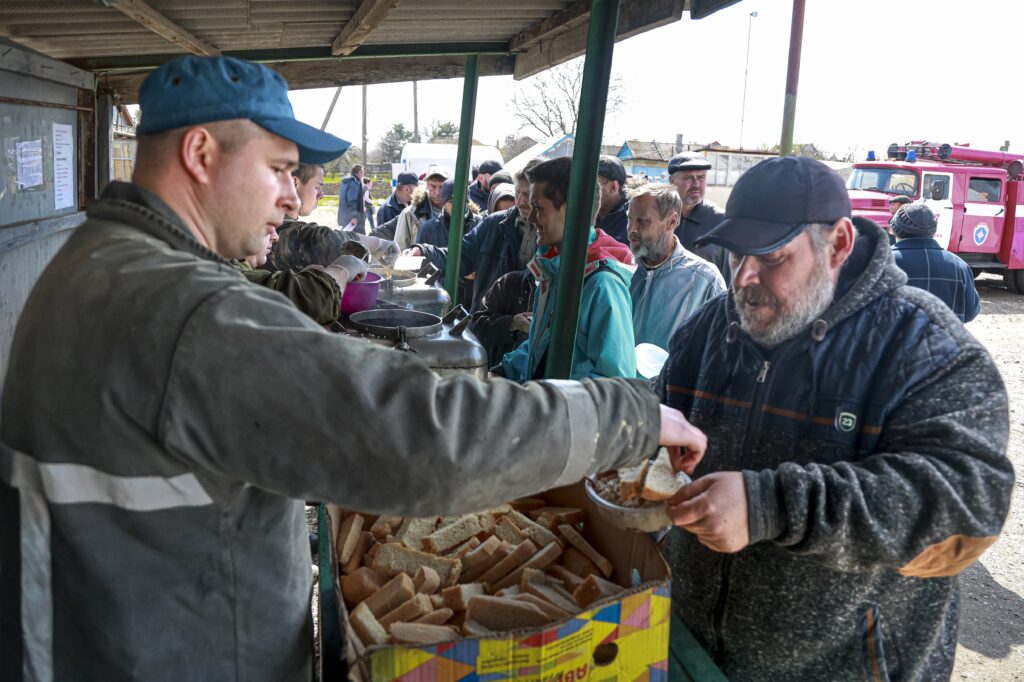
Local civilians line up to get a hot meals distributed by Donetsk People Republic Emergency Situations Ministry in an area controlled by Russian-backed separatist forces in Bezimenne village, eastern Ukraine, April 20. AP Photo/Alexei Alexandrov
Many countries with ongoing strife and in critical danger of famine, like some Horn of Africa nations, are not getting much interest. The cost of a food basket has already risen, particularly in Ethiopia and Somalia, which depend heavily on wheat imports coming from countries in the Black Sea region. In addition, the domino effect of soaring fuel costs adds more pressure on people.
But experts say where support is available, calamity can be prevented.
“We know from past experience that acting early to avert a humanitarian catastrophe is vital, yet our ability to launch the response has been limited due to a lack of funding to date,” said Michael Dunford, regional director for Eastern Africa at the World Food Program.
With the advent of humanitarian crises in Eastern Europe, some donor sources are redirecting their support from already suffering areas to Ukraine.
Up to 20 million people could go hungry this year as delayed rains worsen extreme drought in the Horn of Africa region amid the shortfall in humanitarian aid, warned the WFP.
“Time is fast running out,” the UN agency said in April, with Somalia facing “the very real risk of famine” in the coming six months.
Meanwhile, an estimated 7.2 million Ethiopians are already not getting enough to eat, and half a million Kenyans are just a step away from catastrophic levels of hunger and malnutrition.
“We believe that the Ukraine crisis has indeed taken some of the luster from the needs of the Horn of Africa region,” said Dr. Chimimba David Phiri, the subregional coordinator at the UN Food and Agriculture Organization. “It is important for the world that while they are considering the needs of Ukraine, that they also consider the needs for the Horn of Africa.”
Many countries with ongoing strife and in critical danger of famine, like some Horn of Africa nations, are not getting much interest. The cost of a food basket has already risen, particularly in Ethiopia and Somalia, which depend heavily on wheat imports coming from countries in the Black Sea region. In addition, the domino effect of soaring fuel costs adds more pressure on people.
But experts say where support is available, calamity can be prevented.
“We know from past experience that acting early to avert a humanitarian catastrophe is vital, yet our ability to launch the response has been limited due to a lack of funding to date,” said Michael Dunford, regional director for Eastern Africa at the World Food Program.
With the advent of humanitarian crises in Eastern Europe, some donor sources are redirecting their support from already suffering areas to Ukraine.
Up to 20 million people could go hungry this year as delayed rains worsen extreme drought in the Horn of Africa region amid the shortfall in humanitarian aid, warned the WFP.
“Time is fast running out,” the UN agency said in April, with Somalia facing “the very real risk of famine” in the coming six months.
Meanwhile, an estimated 7.2 million Ethiopians are already not getting enough to eat, and half a million Kenyans are just a step away from catastrophic levels of hunger and malnutrition.
“We believe that the Ukraine crisis has indeed taken some of the luster from the needs of the Horn of Africa region,” said Dr. Chimimba David Phiri, the subregional coordinator at the UN Food and Agriculture Organization. “It is important for the world that while they are considering the needs of Ukraine, that they also consider the needs for the Horn of Africa.”
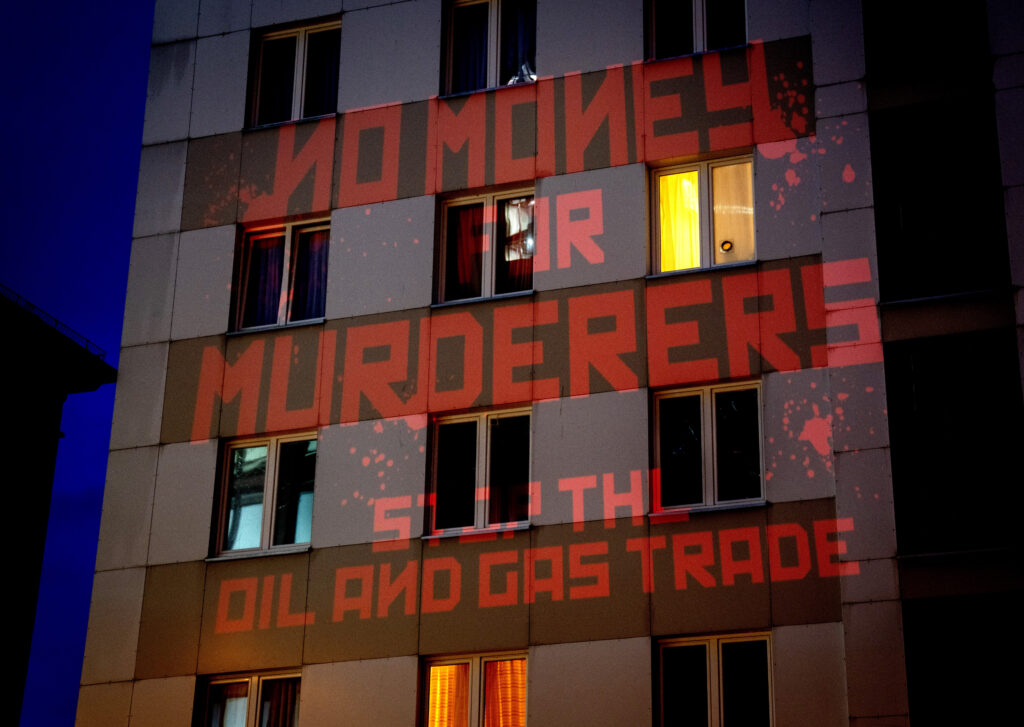
The words “No Money for Murderers, Stop the Oil and Gas Trade” are projected by activists onto the Russian consulate in Frankfurt, Germany, April 4. AP Photo/Michael Probst
Dr. Phiri told journalists in Geneva that besides drought, the region has also been afflicted with conflict, insecurity and desert locusts.
While America and Western powers pour billions of dollars into funding war in Ukraine, their messy fallout of two decades of destruction in Afghanistan is that 95 percent of Afghans do not have enough to eat, and nine million Afghans face famine. UNICEF estimates that a million severely malnourished children are on the verge of death.
“Without immediate action, we face a starvation and malnutrition crisis in Afghanistan,” UN Secretary-General Antonio Guterres said April 21 while appealing for aid.
He warned the international community must find ways to spare the Afghan people from suffering because the U.S. decided to end support for Afghanistan as a way of punishing the Taliban government. These actions have frozen nearly $9 billion in Afghan assets overseas, primarily in America.
“The difficulty here is Ukraine grows enough food to feed 400 million people on planet Earth,” David Beasley, executive director of the United Nations World Food Program, told a podcast for Radio Davos, reported weforum.org.
“So when the farmers on the battlefields aren’t planting or aren’t harvesting, what impact do you think that’s going to have?” he asked.
“Forget the geopolitical ramifications for a moment. The waves of tectonic economic instability unleashed by the Ukraine conflict have shocked and caught the global commentariat of politicians, central bankers, economists and investment analysts off guard,” Bill Blain, strategist at Shard Capital, said in emailed comments on April 21, reported CNBC.
“Inflation from agribusinesses, energy and supply chains is spinning unchecked—and, like a nuclear reaction, they are triggering a host of follow up consequences. It feels a little bit Chernobyl—the reactor is going critical! Our cozy assumptions about how the interconnected globalized economy was supposed to work are being rocked to the core,” he added, according to cnbc.com.
Hunger is also not limited to countries abroad; it’s rising inside of the United States. Feeding America, a national network of groups fighting hunger, warned “around 85 percent of the 200 food bank network, report seeing demand for food assistance increase or stay the same for February compared to the previous month, about a 20 percent increase from the previous survey.”
“With emergency declarations ending across the nation, those additional pandemic-related benefit allotments are expiring state by state, and another hunger crisis is looming,” said Feeding America. “While the pandemic appears to be receding for the time being, Feeding America expects that demand for food assistance will remain elevated and may grow as people’s expanded assistance goes away.”
Dr. Phiri told journalists in Geneva that besides drought, the region has also been afflicted with conflict, insecurity and desert locusts.
While America and Western powers pour billions of dollars into funding war in Ukraine, their messy fallout of two decades of destruction in Afghanistan is that 95 percent of Afghans do not have enough to eat, and nine million Afghans face famine. UNICEF estimates that a million severely malnourished children are on the verge of death.
“Without immediate action, we face a starvation and malnutrition crisis in Afghanistan,” UN Secretary-General Antonio Guterres said April 21 while appealing for aid.
He warned the international community must find ways to spare the Afghan people from suffering because the U.S. decided to end support for Afghanistan as a way of punishing the Taliban government. These actions have frozen nearly $9 billion in Afghan assets overseas, primarily in America.
“The difficulty here is Ukraine grows enough food to feed 400 million people on planet Earth,” David Beasley, executive director of the United Nations World Food Program, told a podcast for Radio Davos, reported weforum.org.
“So when the farmers on the battlefields aren’t planting or aren’t harvesting, what impact do you think that’s going to have?” he asked.
“Forget the geopolitical ramifications for a moment. The waves of tectonic economic instability unleashed by the Ukraine conflict have shocked and caught the global commentariat of politicians, central bankers, economists and investment analysts off guard,” Bill Blain, strategist at Shard Capital, said in emailed comments on April 21, reported CNBC.
“Inflation from agribusinesses, energy and supply chains is spinning unchecked—and, like a nuclear reaction, they are triggering a host of follow up consequences. It feels a little bit Chernobyl—the reactor is going critical! Our cozy assumptions about how the interconnected globalized economy was supposed to work are being rocked to the core,” he added, according to cnbc.com.
Hunger is also not limited to countries abroad; it’s rising inside of the United States. Feeding America, a national network of groups fighting hunger, warned “around 85 percent of the 200 food bank network, report seeing demand for food assistance increase or stay the same for February compared to the previous month, about a 20 percent increase from the previous survey.”
“With emergency declarations ending across the nation, those additional pandemic-related benefit allotments are expiring state by state, and another hunger crisis is looming,” said Feeding America. “While the pandemic appears to be receding for the time being, Feeding America expects that demand for food assistance will remain elevated and may grow as people’s expanded assistance goes away.”

A view of Evonik chemical plant, in Wesseling, near Cologne, Germany, Wednesday, April 6, 2022. Germany’s employers and trade unions have joined together in opposing an immediate European Union ban on natural gas imports from Russia over its invasion of Ukraine. They say a ban on Russian gas would lead to factory shutdowns and the loss of jobs in Germany, the bloc’s biggest economy. (AP Photo/Martin Meissner, File)
The group warned that as food assistance offered because of the Covid crisis ends, Americans will lose critical help. “For participants who qualify for the minimum SNAP benefits, their monthly allotments will plunge from $250 to a mere $20,” said Feeding America.
As the threat of famine and death hovers over the world’s poorest countries, White world rule is also plummeting on account of its iniquity and responsibility for the world’s condition.
In the scriptures warning is given that what the evil have done to others, so shall it be done unto evil doers. The Honorable Minister Louis Farrakhan of the Nation of Islam has warned America that her warmongering and attempts to dominate the nations of the earth will not be successful. He has repeated the warning of his Divine Teacher, the Most Honorable Elijah Muhammad, that what is being witnessed in faraway lands will come to the shores of America.
The Russia-Ukraine conflict impacts the nations of the Earth, and the U.S. will be drawn into the conflict, Min. Farrakhan warned during his Saviours’ Day 2022 message, “The Swan Song,” delivered earlier this year. The Minister said the chastisement and judgment of Allah (God) has begun based on events unfolding around the world. His Teacher, the Most Honorable Elijah Muhammad, taught that America is number one on Allah’s (God’s) list to destroy due to her wickedness against the Black man and woman and darker people of the planet.
All White power must end so that the kingdom of God must be established, and America must reap what she has sown on the world stage, said Min. Farrakhan during “The Swan Song.”
This wickedness includes evil plans yesterday and today including depopulation control and much more.
On several occasions, Minister Farrakhan has referred to National Security Study Memorandum (“NSSM”) 200 titled: “Implications of Worldwide Population Growth for U.S. Security and Overseas Interests” and “The Global 2000 Report to The President,” which detailed using food as a “weapon” to depopulate the Third World. The memo, which became U.S. policy, was written by Henry Kissinger, former secretary of state and national security advisor.
The memorandums proposed global depopulation of the darker peoples of the world. Mr. Kissinger argued “de-population should be the highest priority of U.S. foreign policy towards the Third World.”
The Minister has explained how this strategy was aimed at cutting the earth’s population. “This was taken like a ‘theater of war’! And all factions of government were introduced to this to develop plans, and activate plans internationally, to cull between two-three billion people from the face of the Earth!” Minister Farrakhan said in Part 36 of his “Time and What Must Be Done” lecture series in 2013.
“I’m sorry to tell you: They are planning death on a worldwide scale. They have used a series of methods to affect ‘Global De-Population,’ such as depleted uranium bombs, genetically modified foods, chemical additives in foods, poison in vaccines, famine, AIDS, chemtrails, and illegal wars,” Minister Farrakhan said.
However, as the scriptures also warn: these evil powers will taste the bitter fruit of their iniquity.
“This Plan for ‘culling the population” is not only in the “Third World,’ but it comes right back home to the United States of America,” said Minister Farrakhan.
(Final Call staff contributed to this report.)
The group warned that as food assistance offered because of the Covid crisis ends, Americans will lose critical help. “For participants who qualify for the minimum SNAP benefits, their monthly allotments will plunge from $250 to a mere $20,” said Feeding America.
As the threat of famine and death hovers over the world’s poorest countries, White world rule is also plummeting on account of its iniquity and responsibility for the world’s condition.
In the scriptures warning is given that what the evil have done to others, so shall it be done unto evil doers. The Honorable Minister Louis Farrakhan of the Nation of Islam has warned America that her warmongering and attempts to dominate the nations of the earth will not be successful. He has repeated the warning of his Divine Teacher, the Most Honorable Elijah Muhammad, that what is being witnessed in faraway lands will come to the shores of America.
The Russia-Ukraine conflict impacts the nations of the Earth, and the U.S. will be drawn into the conflict, Min. Farrakhan warned during his Saviours’ Day 2022 message, “The Swan Song,” delivered earlier this year. The Minister said the chastisement and judgment of Allah (God) has begun based on events unfolding around the world. His Teacher, the Most Honorable Elijah Muhammad, taught that America is number one on Allah’s (God’s) list to destroy due to her wickedness against the Black man and woman and darker people of the planet.
All White power must end so that the kingdom of God must be established, and America must reap what she has sown on the world stage, said Min. Farrakhan during “The Swan Song.”
This wickedness includes evil plans yesterday and today including depopulation control and much more.
On several occasions, Minister Farrakhan has referred to National Security Study Memorandum (“NSSM”) 200 titled: “Implications of Worldwide Population Growth for U.S. Security and Overseas Interests” and “The Global 2000 Report to The President,” which detailed using food as a “weapon” to depopulate the Third World. The memo, which became U.S. policy, was written by Henry Kissinger, former secretary of state and national security advisor.
The memorandums proposed global depopulation of the darker peoples of the world. Mr. Kissinger argued “de-population should be the highest priority of U.S. foreign policy towards the Third World.”
The Minister has explained how this strategy was aimed at cutting the earth’s population. “This was taken like a ‘theater of war’! And all factions of government were introduced to this to develop plans, and activate plans internationally, to cull between two-three billion people from the face of the Earth!” Minister Farrakhan said in Part 36 of his “Time and What Must Be Done” lecture series in 2013.
“I’m sorry to tell you: They are planning death on a worldwide scale. They have used a series of methods to affect ‘Global De-Population,’ such as depleted uranium bombs, genetically modified foods, chemical additives in foods, poison in vaccines, famine, AIDS, chemtrails, and illegal wars,” Minister Farrakhan said.
However, as the scriptures also warn: these evil powers will taste the bitter fruit of their iniquity.
“This Plan for ‘culling the population” is not only in the “Third World,’ but it comes right back home to the United States of America,” said Minister Farrakhan.
(Final Call staff contributed to this report.)
No comments:
Post a Comment